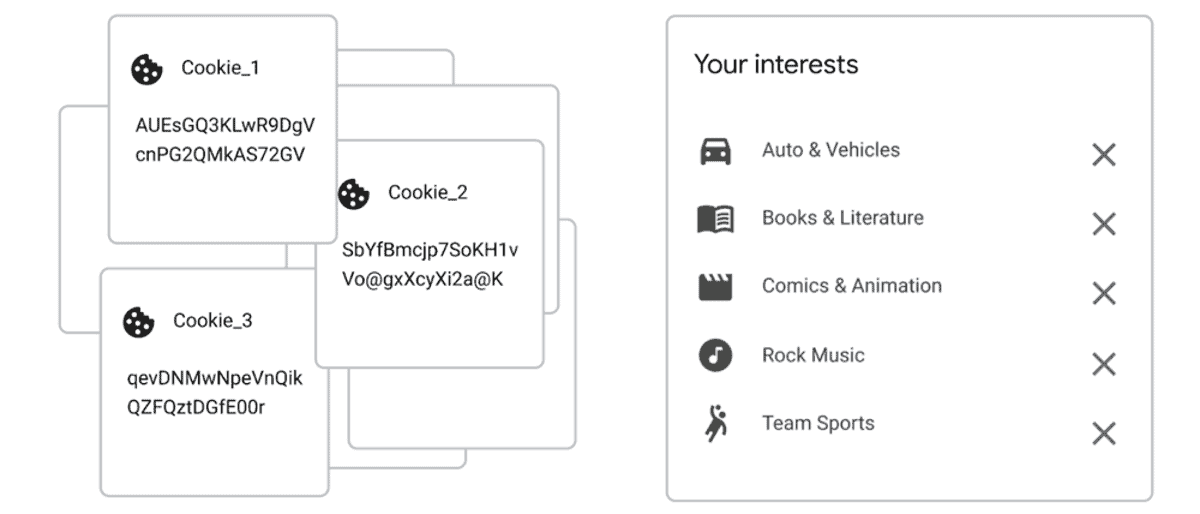Google drops FLoC and announces Topics as the future cookie-less advertising system

Google announced the new Topics API for its Privacy Sandbox project on January 25, 2022, which replaces the controversial FLoC project.
When Google announced FLoC, Federated Learning of Cohorts, back in mid-2021, it revealed a plan to shift online advertising from user tracking to group tracking. Users would no longer be tracked individually through the use of cookies, but would join cohorts based on their interests. Sites would gain access to these interests and advertisement could be displayed based on that.
A FLoC-supporting program such as Google Chrome would analyze the browsing history of the user, join a cohort based on the data and store the information locally.
Companies like DuckDuckGo, Brave or Vivaldi rejected FLoC for a number of reasons, including that cohort information could become a strong fingerprinting identifier, as cohorts consisted of a few thousand users. Other objections included letting Google determine what it considered sensitive information, which the company wanted to exclude from being used for advertising purposes, and informing any site about interests, even if sites were never visited in the past.
Update: Brave published a statement on its site stating that Topics does not address all of the company's points of criticism. In particular, it is still Google that is deciding what is sensitive and as such excluded from being used for advertising purposes. Topics limits the exposure of a user's interests to sites visited in the past, and the advertisers that were loaded on those sites. The limitation benefits large advertisers, including Google, and puts smaller advertisers at a disadvantage.
FLoC, Privacy Sandbox, and the Topics API do not improve privacy; rather, they’re proposals to make the least private browser slightly less bad. They’re an incomplete and insufficient effort by Google to catch up with other browsers that offer real privacy protections (and that have done so for years).
End of Update
The announcement by Vinay Goel, Product Director Privacy Sandbox and Chrome at Google, confirms that Google dropped FLoC from its Privacy Sandbox program. The company plans to replace it with the Topics API, which Goel introduces in the blog post on The Keyword blog.
Topics is based around the idea of associating topics with a user's browsing behavior. Programs like Chrome will still analyze the browsing history to determine these topics, but users won't be assigned to cohorts anymore.
A "handful" of topics that represent a user's top interests are determined and kept for three weeks. Old topics are deleted after that time while new topics added, based on the user's browsing. The entire process happens locally according to Google.
When a user visits a site, the site is informed about three of the available topics, one from each week of browsing. The site and its advertising partners may use the information to display advertisement to the user.
Google plans to introduce controls that make the entire process transparent for the user; this includes options to see topics, remove them, or even disable the feature entirely. Topics won't include sensitive topics such as gender or race according to Google.
Additional information about Topics is available on the Privacy Sandbox website and on GitHub.
Closing Words
With more and more companies dropping support for FLoC, it was clear that Google had to do something. Topics replaces FLoC, and it addresses some of the major concerns levelled against FLoC. Whether Google is more successful in convincing other browser makers and companies to include Topics in their products, or in the case of Chromium-based browsers, not disable it, remains to be seen.
Now You: what is your take on Topics?




















classic tactics. announce/introduce something you know will create a storm. give it a while to let people rage/argue. introduce something dressed up pretty that’s very nearly the same and people/companies will accept.
I’m betting everything I have that topics will gain traction with the aforementioned companies. some of whom were undoubtedly just making noise to show they care about you
Manifest V3 + Invasive tracking are coming, like it or not. Mozilla won’t hold out for long and will eventually follow Google’s lead.
> Mozilla won’t hold out for long and will eventually follow Google’s lead.
The main reason why Google abandoned FLoC was because Amazon and other major companies refused to adopt FLoC, and the companies that had expressed their intention to adopt it changed their mind one by one to “discontinue support”.
The alternative specification for FLoC, the Topics API, will depend on the volume of companies that adopt the Topics API.
As with FLoC, it is unlikely to get positive buy-in from companies.
Mozilla will naturally be quiet about the Topics API.
And Google will probably abandon the Topics API if it can’t get support from companies.
However, the Comments are notably users of Firefox and derivative browsers.
Users of Google Chrome and Chromium seem to be silent, but are they not aware of the problem?
Google’s mastery (that end users will not disengage) has been proven.
@owl
???
The content of this article has something to do with Chrome, not Chromium. Chromium-based browsers aside from Chrome will not have this turned on by default (so much for “Google’s mastery”, even in Chrome you can already opt out).
As for the Firefox users, 3% market share makes them desperate.
@Iron Heart
https://www.ghacks.net/2022/01/26/google-drops-floc-and-announces-topics-as-the-future-cookie-less-advertising-system/#comment-4514001
I’m not even going to try to understand this marketing gibberish. Not well thought out because it’s not supposed to be; it’s just noise.
You can get some privacy with Chrome but Google’s not going to give it to you, Chrome is a user data collector and Google’s an ad company. Wouldn’t make sense if they voluntarily did anything that negatively affects revenue. ALL of their products are ad servers.
Same rubbish with a different name. This needs to be stopped as well.
Google lowered the heat temporarily, but as we see here, they’re always going to be trying to boil that frog.
I’ll never use Chrome, but I do use Vivaldi as an alternative browser (set to delete all cookies on closure), so that means I’m involved with Chromium. And my primary browser, Firefox, undoubtedly will follow along with some variant of Topics API at some point. However, it does sound like Topics may not be a major problem for me personally if Google is truly being transparent about allowing Chromium users to fully opt out. Of course, the devil is in the details, and Google has made it abundantly clear that they will push any limits, even self-imposed ones, as far as they possibly can in their obsessive hunger for data, as well as mislead users when necessary to enable them to fulfill their noble mission of obtaining people’s personal information for the use of advertisers.
Here comes again in 3,2,1… corroded_head touting about how coward-pocket browser is not going to have this new all-wanting-to-see-G privacy scourge gimmick.
Well you already stated that Brave will not have this crap turned on by default, why should I come here just to rinse and repeat? Thank you for writing my comments, albeit in abysmal quality.
You know what website the user is visiting at the moment of ad delivery, so why not just serve an ad based on that website’s overall theme? No need to track the user’s entire browsing history, iif they are ckearly on a technology-oriented website serve them technology-based ads. Do not show me where to shop for furniture while on a technology website. I honestly believe they do not want something like this. The end goal is to track the user. Thankfully the user still has the last word in all this nonsense and can just boot the advertisers out off their screens.
@Yuliya had previously placed the highest priority on “invasion of privacy” in determining the acceptability of application software.
Why are you so obsessed with Google, a pawn of the NSA (National Security Agency)?
Doesn’t the inconsistency of your words and actions give you a dilemma?
This all sounds great! … If you don’t understand how ads work for the advertiser (from mom & pop to large corporation).
Retargeting is a huge part of advertising strategy. For example, a user abandons a cart at one of their favorite etailers (could be a bricks & mortar corporation, or a m&p niche ecommerce site) – just one of many uses and values for advertisers.
It is very cheap to get a positive return on investment on retargeting ads (relative to ads to “cold” audiences). Why? Because that user already showed high intent to purchase (i.e. a “hot” audience).
When we look at this at scale (i.e. across Google, Facebook, etc – and even non-ecommerce websites that target advertising to their own visitors) expect a significant decrease in product available to you, from fewer suppliers, and at higher prices.
Now, you may not care about that (because you don’t see that other side), but, if we suddenly adopted your proposal, think of the overall affect on the economy (think jobs/wages, your retirement stock values, price of your home, etc.).
You may not believe it, but it truly is that big of a deal – online advertising has become that integral now.
@RD
NIce joke, you should get into standup!
contextual ads are at least four times cheaper and just as effective. Targeted advertising is a scam
FLoC was the worst idea ever, a tracking system to block tracking ads. Thanks @Martin. :]
First of all
From me too, Thanks ghacks.net :]
And I agree with @Tom Hawack.
In addition, quote from the URL provided:
https://www.inc.com/jason-aten/google-just-gave-you-best-reason-yet-to-finally-quit-using-chrome.html
Google Just Gave You the Best Reason Yet to Finally Quit Using Chrome
The browser is no longer a thing that exists for you to navigate the internet.
By Jason Aten, Tech columnist@jasonaten
> Google, which doesn’t even need third-party cookies to know what you’re interested in, since it literally runs the website where billions of people just tell it what they’re looking for.
> The thing is, no one likes FLoC. Privacy experts hate it because it’s not actually more private just because the tracking and profiling happens in your browser. Advertisers and ad-tech companies don’t like FLoC because, well, they like cookies. They’d mostly prefer Google just leave things alone since cookies are what let them know exactly when you click on an ad, put something in your cart, and buy it.
> Google says that Chrome will allow users to view the “Topics” they are associated with, and give them the ability to delete them. Google isn’t asking users if they’d like to be part of Topics–it’s just leveraging the fact that it owns Chrome to force users to be a part and then giving them a way to opt out if they want. That’s great, except almost no one is ever going to do that. Google knows that.
> Ultimately, that change in the way Google is looking at Chrome–that it isn’t a tool that serves its users, but is a tool that serves up users to advertisers, albeit in a slightly more privacy protective way–is a bad sign. It’s also the best reason to finally ditch it altogether.
Brave Software, the Chromium vendor that has been making unusually large strides (doubling in size every year, surpassing 50 million active users, and on the verge of the 100 million mark), deserves praise for being the immediately to issue a statement against Google’s publicly announced adoption of the Topics API.
The “Idle detection API” fiasco is still fresh in our minds.
End users should not be indifferent to those “APIs”.
Maybe not ever. ‘Topics’ could be the final straw :
“Google Just Gave You the Best Reason Yet to Finally Quit Using Chrome”
https://www.inc.com/jason-aten/google-just-gave-you-best-reason-yet-to-finally-quit-using-chrome.html
@Tom Hawack OMG, you’re right, maybe not ever! LOL
FLoC flop. The king is dead, long live the king : ladies and gentlemen let’s give a big hand for HRH Topics.
Laugnable, pathetic. In an increasingly privacy-aware environment, a company striving to find the equation which combines privacy-invasive tracking advertizement with the legitimate human dignity psychological and sociological factors is.
But the problem is far more complex. Most Websites need funding, need to say. Advertizement is the most called savior. Google is not the solution but a major actor of the problem. What is needed is a world-wide non-profit organization which would centralize the ad business, be the junction point, the relay between companies and consumers, and that would mean 100% ad revenue for the Websites minus the strict minimum for the organization to function, no profit. Sounds naive because it is. Generally speaking the idea of pondering business with a minimum of ethics is the way to go, because at the end it is the smartest way to survive.
Whatever Google’s equation I’ll continue to avoid the company to the maximum extent considering my Web aspirations, which means Google is blocked in terms of cookies, that I use but Google Maps only for its Street View feature (OpenStreetMap is far better in terms of mapping itself, IMO) and Google Images only, that YouTube cookies are not blocked because required for proper video rendering, and that’s about all. I’ll never offer body and soul to Google : just knowing the company’s fame, the number of users diving into its deep, opaque waters is beyond my understandment.
Let’s face it : the Web would run far better without the GAFAM companies, and “G” is the major parasite. Its servers are everywhere, for crying out LOUD!
Chrome would still be tracking you to profile your interests and send that info to advertisers.
So this is just less detailed tracking, but still tracking and profiling.
And it will be buildt into the browser and Google will later probably make sure extensions can not block it.
Google may try and make it harder for Chromium-based browsers to disable it.
Google may even try to make it hard to block the Topics traffic by making it go to their general purpose cloud services, which would disrupt many websites and servcies if blocked.
I use Firefox, Ungoogled Chromium and Brave.
If Ungoogled Chromium and Brave does not disabled this, I will have to stop using them.
I hope Firefox survives and gets new mangement, but for now the future of privacy on the internet looks bad.
“So this is just less detailed tracking, but still tracking and profiling.”
It’s not less detailed at all. The front end the consumer sees is renamed to sound less malicious. On the back end the same data is being collected.
Google basically admitted that it has been datamining user browsing history (and who knows what else) this whole time. FLoC and Topics are two services utilizing that data.
If you have been using Google products and Chrome you have a profile at Google, very similar to what could be considered a Social Score, or a Credit Score. It contains a shocking amount of info about you, there is no third party/legal oversight for how Google uses your data/metadata and how much it actually has.
If Google wasn’t a US company it would have been banned around the world already.
Off Topics
My interests are not having to see any advertising whatsoever. Is there an interest group for that?
> My interests are not having to see any advertising whatsoever.
Are you really only interested in “ADVERTISING”?
In fact, the majority of end users have the same values as you (The insensitivity of only being able to feel the awareness of “problems” only in what you can see).
I am painfully aware of the futility of “preaching” to the (value’s) poor.
An ad blocker?
firefox, i guess?
@Anonymous
Firefox is not anti-ad industry. uBlock Origin is, but not Firefox. Firefox’s existence rests on the continued existence of Google.